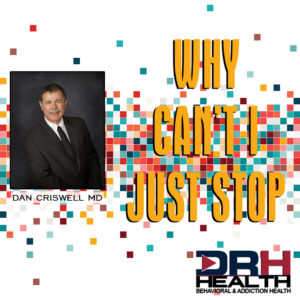Why Can’t I Just Stop
People who don’t have addiction or understand how addiction works have trouble understanding why someone who compulsively uses substances that brings harm to the user and brings hurt and destruction to all those around them. You know, you would think someone who hits their thumb with a hammer while pounding nails wouldn’t keep doing it over and over again. Common sense says, “just stop doing/taking those substances.” “Just exercise your will power” Believe it or not, the person suffering with the disease of addiction has wondered and said to themselves these same things. They have the drive and will power to accomplish other things – why not this?
The substances of addiction bring about profound chemical changes in the brain of someone with the disease of addiction. These substances take over the area of the brain where we all sense reward – that feeling of experiencing something that brings a good feeling. Some of these substances like cocaine and amphetamines profoundly intensify this feeling – but certainly alcohol, opiates, benzodiazepines, marijuana and other mood and mind altering substances (even nicotine and caffeine) in the brain of someone with the disease of addiction produce this feeling. But why is the brain of the addict different – why does their brain react to such substances in such a way that the substance takes over – the substance “hijacks” this reward center? And there is not a simple answer. In very close proximity to the reward area of the brain is the part of the brain that controls memory, emotions and drive. People with addiction are “wired differently.” And due to genetic, environmental, exposure and experience differences, the person with the disease of addiction becomes dependent on the presence of that substance to stimulate the reward center and control those areas of the brain that modulate emotion, memories and drive. And though use of these substances brings harm, that portion of the brain that reasons is over-ridden by this portion of the brain that controls reward. Ultimately the substance someone used in the beginning to stimulate the reward area quits working – the brain no longer produces that feeling of reward. Instead the person with the disease of addiction keeps taking the substance to avoid the symptoms of withdrawal that happen if the substance isn’t use. Someone with the disease of addiction is now in the throes and control of the substance. Life now has become a perpetual nightmare.
But there is a way out. And yes it ultimately requires cessation of using the substance. But in order to heal those areas of the brain that have come under the direction and influence of the substance, treatment is often necessary. Treatment consists of many elements delivered by people with skills in successfully treating the disease of addiction.
The Duncan Regional Hospital Behavioral and Addiction Health clinic is here to help anyone who is caught in the throes of addiction. Our providers had skill and experience to successfully treat the disease of addiction. The treatment is compassionate and a comprehensive outpatient treatment that addresses those elements that have been disordered due to addiction. If you or someone you love is willing to accept treatment, we are here to provide.
Dan Criswell, MD
Duncan Behavioral Health and Addiction
